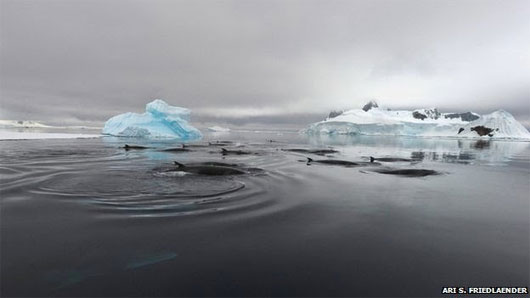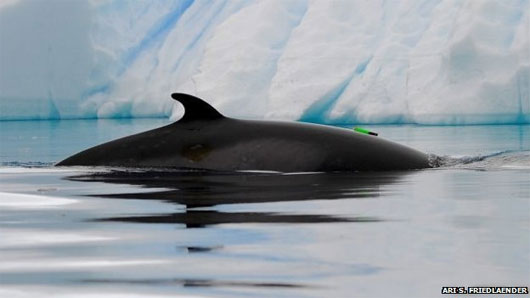Decode the mysterious sound of
The mysterious sound - the "card, the card" outside the ocean, is especially heard in Antarctic waters, making people curious for the past 50 years - just decoded by American scientists.
The mysterious sound nicknamed 'bio-duck' - dates from the 1960s in the winter and spring in the South Ocean. However, no one knows the origin of this incredible sound, including researchers. So far, recorders have shown this to be an underwater conversation of the spearhead Antarctic whale . These findings have just been published in Biology Letters.

Scientists say the sound of the "card" is an underwater conversation of spearhead whales in Antarctica
Lead researcher Denise Risch from the East North Massachusetts Aquatic Science Center of the US National and Atmospheric Administration (Noaa) said: 'It's hard to find the source of this signal. There are a few similar theories that were made in previous years but no one really proved that this species made a strange sound until now. '
The mysterious sound was first discovered by submarines about 50 years ago. The listeners were amazed by the sound of "card, card " like a duck. Since then, this noise keeps repeating, especially the low frequency sound recorded many times in the waters around Antarctica and Western Australia. Speculation about the origin of the mysterious sound also changes over time, from fish to ships.
But now, the researchers have said they have authentic evidence of 'bio-duck' sound, which is the spearhead Antarctic whale . In 2013, scientists attached tape recorders to two sharp whales and noted that the animal was making strange noises.

The recording device is attached to two spearhead whales
However, scientists are still unclear at what point the spearhead whale makes a strange sound, although the recorded sound indicates that they emit near the water surface and before diving into the depths. Yang to eat bait.
The team also said that decoding the sound mysteries for a long time will help them continue to monitor and understand more about this less studied animal."This can give us a sense of the timing of the migratory whale's migrations, the exact time they appear in the Antarctic waters and leave here," said Dr. Denise Risch.
This is not the only sound that scientists have deciphered in recent times. Another noise nicknamed 'Bloop' has just been discovered - the sound of ice breaking in Antarctica.
- Decode the mysterious sound of the Northern Aurora
- Decode whale sounds
- The Hum - The mysterious sound challenges the scientific world
- Listen to the mysterious sound obtained from the deepest
- The scaryness of sound: saving people and destroying each other in a narrow way!
- Mysterious sounds like the sound of
- Australia developed artificial intelligence to decipher mysterious sound signals from the universe
- The mysterious sound of the seabed worries the Canadians
- People in the whole town are wild because of the strange sound
- Decode 13 strange sounds of the body
- The mysterious sound is captured outside the Earth
- Ghost radio in Russia plays a mysterious sound for nearly 50 years
 'Fine laughs' - Scary and painful torture in ancient times
'Fine laughs' - Scary and painful torture in ancient times The sequence of numbers 142857 of the Egyptian pyramids is known as the strangest number in the world - Why?
The sequence of numbers 142857 of the Egyptian pyramids is known as the strangest number in the world - Why? History of the iron
History of the iron What is alum?
What is alum?